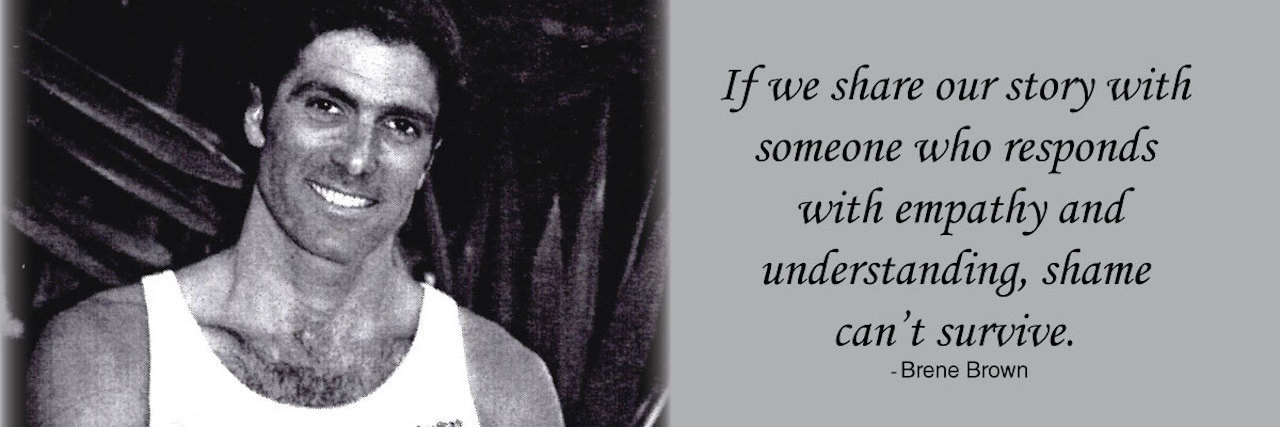Why Silence Perpetuates Suicide Stigma
Some recent experiences have sharpened my suicide awareness focus since Steve, my soulmate and best friend for over 33 years, died by suicide in 2015. In the two years since Steve passed, I see that suicide stigma is still alive and well.
Recently, unaware of Steve’s death, an acquaintance asked me about my husband. When I told her how he died, her startled look and response blew me away. She said: “Who told him to do that?” Clearly this was said out of ignorance and discomfort. I was not angry, but rather sad, both for her and Steve and myself, in that she was shocked and did not know what to say. I believe this is mainly because of the stigma of suicide, an uncomfortable topic no one wants to talk about it.
The second experience was with a woman who lost her son to suicide. I asked her if she wanted a picture of him to be included in a memorial photo collage that was being shown at an International Survivors of Suicide Loss Day event, sponsored by the American Foundation for Suicide Prevention (AFSP), on November 17, 2018. I believe she struggled with how to respond and after giving it some careful thought, she declined and in so many words indicated her decision was based on how the rest of his family might feel about her openness in publicly acknowledging the cause of her son’s death. I respect her decision, as we all need to come to terms with the suicide of a loved one in our own time. But, it should not have to be such a painful and divisive struggle for the suicide loss survivors. If this was a memorial to those who died of cancer or heart disease, would the same stigma exist? Would her response be the same? I think not.
In the early days after Steve passed, I was guilty of feeling shame talking about Steve’s death by suicide. After he died, I told a local reporter he could not put the cause of Steve’s death in his story. Not too long after, I realized I was perpetuating the suicide stigma with my silence; only natural since I, along with many in today’s society, felt it was a taboo topic, too embarrassing to talk about publicly.
However, some progress is being made to help lessen the suicide stigma. Earlier this year, Logic, a popular young singer, released a powerful suicide prevention anthem. The title of the song is the toll free suicide prevention hot line: “1-800-273-8255.” And the lyrics are written from the perspective of someone who has called the hotline because they wanted to end their own life. The hotline has received record call volumes since the song’s release.
The fact that the well-known and beloved actor and comedian Robin Williams died by suicide was not suppressed by his family or in the media. The death by suicide of two recording artists, only two months apart earlier this year, Chris Cornell, lead singer of Soundgarten and Audioslave and Chester Bennington of Linkin Park, were not concealed. The more dialogue there is about suicide, perhaps the survivors of suicide loss will not be burdened with trying to conceal the cause of the death of their loved one.
According to AFSP, suicide is the 10th leading cause of death and over 44,000 people die by suicide each year in the United States. Many suicide attempts, however, go unreported or untreated. Surveys suggest that at least one million people in the U.S. each year engage in intentionally inflicted self-harm. These numbers are alarming and the fact that most people do not want to talk freely about this cause of death is even more alarming.
Maybe someday, in the not too distant future, people will be able to talk openly about suicide. Until then, I will continue to be very vocal about Steve’s story. I believe if we can eliminate the stigma, those who struggle with thoughts of taking their own life, will not feel embarrassed to reach out for help. Also, for the loved ones of those that continue to be lost to suicide, perhaps the permanent sadness in the eyes of the suicide loss survivors will lessen slightly when they no longer have to carry the suicide stigma burden, which might only deepen that sadness.
Follow this journey here.
If you or someone you know needs help, visit our suicide prevention resources page.
If you need support right now, call the National Suicide Prevention Lifeline at 1-800-273-8255, the Trevor Project at 1-866-488-7386 or reach the Crisis Text Line by texting “START” to 741-741.
We want to hear your story. Become a Mighty contributor here.
Lead image via contributor

